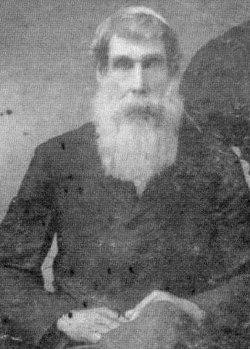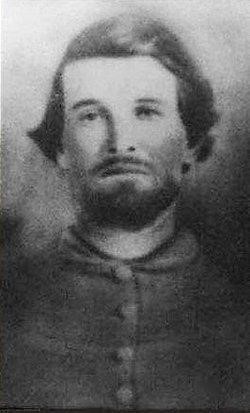My Civil War Brady Bunch: The Flowers Family at War
ECW welcomes back guest author Samuel Flowers.
Emerging Civil War recently posted a “Question of the Week” asking if anyone had an ancestor who had fought in the Civil War. The comments were filled with very interesting stories of soldiers and sailors who, if not for their descendants, would have been lost to time. I thought that telling my family’s story would give further documentation of ordinary soldiers who otherwise would have been forgotten.
My five-times great-grandfather went by William Lovelace “Love” Flowers. Love, the son of a Revolutionary War veteran, resided in Marion County, South Carolina and was considered a leading patriarch at around 63-years-old. A religious man, Love lived up to his name, and between two marriages, he fathered twenty-four children: two sons from his first wife and the rest from his second. According to an 1860 census, Love and his family were farmers just like many were in Marion County, a region of the Palmetto State that was predominantly rural.[1]

By the time the war started, it is safe to say that Love was a staunch pro-Confederate and believed in South Carolina seceding from the Union. Of his twenty-four children, thirteen lived to adulthood, and eleven were military-age men eager to serve the Confederate cause.[2] In my research and knowledge of the American Civil War, I do not know if any family had more brothers in one family who served. According to some records available, these are the names and regiment information found:
- Pvt. Archibald “Love” Flowers, Company G, 10th SC Infantry
- Pvt. Burnett Flowers, Company I, 10th SC Infantry
- Pvt. Barnabas Abraham Flowers, Company L, 10th SC Infantry
- Pvt. Clayton Flowers, Company I, 10th SC Infantry
- Pvt. Elly Flowers, Company L, 21st SC Infantry
- Pvt. Henry Flowers, Company F, 4th SC Cavalry
- Pvt. Joel A. Flowers, Company F, 4th SC Cavalry
- Cpl. John Flowers, Company I, 10th SC Infantry (my 4x Great-grandfather)
- Pvt. Nathan Flowers, Company L, 10th SC Infantry
- Pvt. William Flowers, Company L, 21st SC Infantry
- Pvt. Williamson Flowers, Company D, 10th SC Infantry
It’s safe to say that for going to war, the Flowers believed it to be a family affair and something they would all do together. Unfortunately, of the eleven brothers who went to fight, only six would return home, while the rest would perish in less discussed areas of the Civil War. The Flowers clan and their military service are closer to the reality of what most soldiers endured. Many soldiers did not go home and tell stories from the battlefield with visions of glory and grandeur. Some brothers were spared the fate of campaign and combat. William, Clayton, and Elly were mustered out of service in 1862-1863 due to enlistments running out and old age. As for the others, they experienced the realities of soldier life.
The two brothers, Henry and Joel, riding with the 4th South Carolina Cavalry had relatively tame military experiences. Their regiment was stationed in the Department of South Carolina in 1862-1863. They were reassigned in March 1864 to the Army of Northern Virginia and saw their first real taste of combat during the Overland Campaign. The unit took heavy losses during the fighting near Cold Harbor and the following battles as the Confederates marched toward Petersburg. Records are unclear when it occurred, but both brothers were captured and sent to Elmira Prison after combat at either the battles of Haw’s Shop or Trevilian Station. Both men became ill from dysentery almost as soon as they arrived, with Henry recorded dead in September 1864 and Joel in March 1865.[3]
As for the other brothers, Archibald, Burnett, Barnabas, John, Nathan, and Williamson, their infantry regiment was assigned to the Confederate forces in the Western Theater. There it was organized in November 1862 into the Army of Tennessee. The following month, the brothers fought at the battle of Murfreesboro and survived without significant injury.

By 1863 the Flowers brothers of the “Bloody Tenth” started to drop like flies. In mid-September, Burnett contracted dysentery and died of the disease at a field hospital near Atlanta. Soon afterward, during the siege of Chattanooga, the regiment was under heavy fire while defending Confederate positions along Missionary Ridge. Nathan was captured by Union soldiers and sent to Rock Island, a prisoner-of-war camp located in Illinois. He contracted tuberculosis while in camp and died in January 1865. By 1864, only Archibald, Barnabas, John, and Williamson were left in the regiment.[4]
Tragedy continued befalling the surviving brothers into 1864. During the battle of Resaca, early in the Union campaign against the Confederate hub of Atlanta, Barnabas was wounded in the leg and sent home for the rest of the war to recover. The other brothers survived the rest of the war as they and their regiment battled through the Atlanta Campaign, Franklin, Nashville, and Bentonville. Aside from the brothers who were discharged early in the war, these three had slugged it out through some of the fiercest fighting in the Western Theater. For Love Flowers, he lost five sons, gone forever and buried somewhere far away from the family plot. Even the sons that did return home were still casualties from the war. Some came home wounded physically, while others were forced to hold traumatic images of visceral combat in their minds for the rest of their lives.
The Flowers brothers represent the horrors and realities of the American Civil War. Like so many others in the war, disease killed more than combat, and many were infected in camp or as a POW. Large families joined and fought in the same regiments, only for battle and disease to pluck away their loved ones. Those who returned home after fighting were scarred both physically and mentally and attempted to make sense of the destruction they had witnessed. For the Flowers brothers, there was no glory and sense of adventure by the end of it, only pain and mourning.
Sam Flowers is an assistant professor and teaches American History at Louisburg College. He received his B.A. from UNC-Charlotte and graduated with his M.A. from the University of North Carolina at Wilmington under the guidance of Angela Zombek, PhD. His thesis looked at the significance of the Overland Campaign from the lenses of military significance, common soldier experience, and memory and memorialization. He is researching the Third North Carolina Infantry as its war service transitioned, perpetuating Confederate myth and memory.
Endnotes:
[1] W.W. Sellers, A History of Marion County, South Carolina, from Its Earliest Times to the Present, 1901 (University of Wisconsin- Madison, 1902), 504-505.
[2] Ibid, 505.
[3] John C. Rigdon, Historical Sketch and Roster of the South Carolina Fourth Cavalry Regiment (Cartersville, GA: Eastern Digital Resources, 2018), 150.
[4] Cornelius Walker, Rolls and Historical Sketch of the Tenth Regiment, So. Ca. Volunteers, in the Army of the Confederate States (University of California: Walker, Evans & Cogswell, printers, 1881), 49,59.
What a story. Wow. That’s a huge family connection. Thanks for sharing it!
That is an amazing story. Incredible that so many brothers were in the war. This story looks like it could be a book.
Thank you for telling us about this amazing family.
This was so interesting! You came from quite a legacy! Thanks for sharing. You continue to improve!
Don’t stop writing.
thank you Sam for sharing your family history …. i recently read Drew Gilpin Faust’s This Republic of Suffering, Death and American Civil War … with three quarters of a million killed from combat and disease, she argues that the “harvest of death” was a ubiquitous presence that touched every American family regardless of race, religion, social status, or political ideology … your family definitely felt that harvest.
That compares to my family in New Orleans. Among four families, all first cousins, all the young men of military age went to war – 5 males. Three of the 5 served all four years. Surprisingly, all 5 returned from the war, but one died within 13 years of the war – likely due to a malady contracted during the war. One killed himself 20 years after the war during an extended bout of Depression, possibly PTSD related.
Tom
Great story Love is my 3 x great grandfather i would like to meet more of my family that i’ve just started researching i visited his grave last year in SC for the time thanks for this story
Lovelace was my great great grandfather,his oldest son John was my great grandfather. I have a metal photograph of John ,sitting on his horse waving a pistol in both hands.